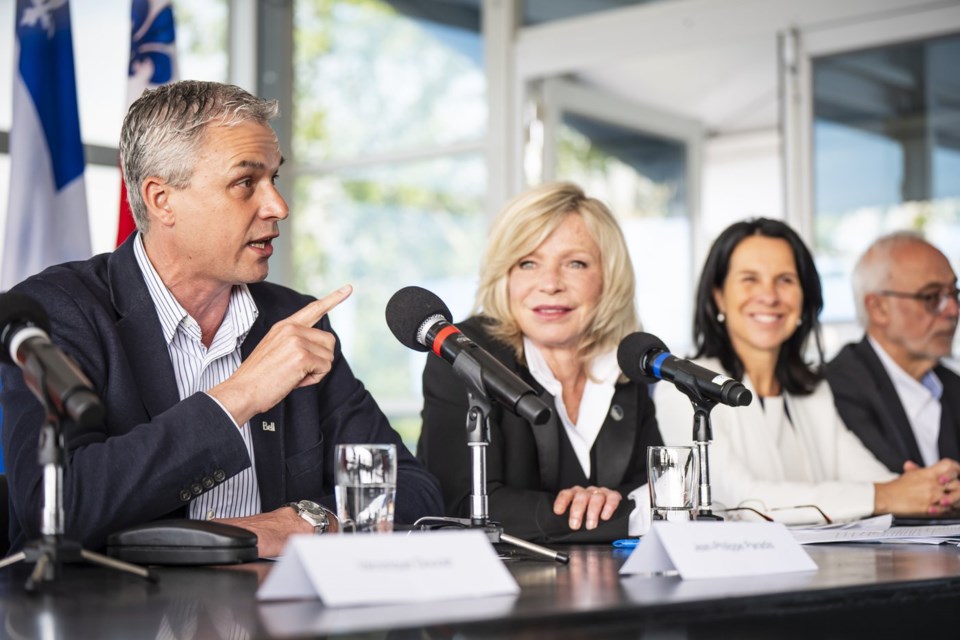MONTREAL — The Canadian Grand Prix is staying on the Formula One calendar until at least 2035.
Octane Racing Group — the Canadian GP promoter, which is owned by Bell — and various government officials announced a four-year contract extension with F1 on Tuesday.
The previous deal ran through 2031. F1 extended an agreement signed through 2029 for two years after the COVID-19 pandemic shut down the 2020 and 2021 editions.
“The Grand Prix is part of the summer events in Montreal,” Mayor Valerie Plante said. “It actually starts the tourist season, the festival season as well, so to know that for the next 10 years it is secured, it is fantastic news.”
Plante joined Octane Racing Group president and CEO Jean-Philippe Paradis, Quebec Tourism Minister Caroline Proulx and federal MP Carlos Leitão in a news conference on Île Notre-Dame — the site of the track — on Tuesday morning.
Tourisme Montreal president and CEO Yves Lalumière and Société du parc Jean-Drapeau executive director Véronique Doucet were also on hand for the announcement.
The officials pledged $117 million over four years as part of the contract with F1 owners Liberty Media.
The federal government will put in $39.2 million, the province $31.1 million and the Société du parc Jean-Drapeau $7.8 million — including $1.7 million directly from the city.
Tourisme Montreal, funded by private sources and all three levels of government, will contribute $39 million.
Grand Prix weekend provides a major economic boon to Montreal. An announced 352,000 spectators attended this year’s event over three days.
"The economic returns are far bigger than the investments from three levels of government, so it's a win-win formula,” Leitão said.
Lalumière said Tourisme Montreal projects nearly $1 billion in tourist spending over the extension's four years, adjusted for inflation. Plante later said this past race weekend alone brought in about $100 million in economic returns, though official numbers have not yet been released.
Lalumière said the city’s hotels were 90 per cent full last weekend, and that 55 per cent of Grand Prix attendees came from outside Montreal.
The extension landed after a well-received Grand Prix weekend, a much-needed win for organizers after last year’s fiasco sparked speculation about whether Montreal would stay on the F1 calendar.
Congestion, flooding and ill-timed downtown patio inspections disrupted the 2024 edition and damaged the race’s reputation.
Organizers made several upgrades ahead of this year’s event, doubling hospitality tents for F1 teams, redesigning the entire paddock area and increasing access points to the island to improve circulation.
“I spoke with some people who said it took them seven minutes to get on site,” Paradis said. “I’m very proud of that.”
Minister Proulx said last year she was ashamed of the string of failures, which led to several meetings with F1 president and CEO Stefano Domenicali in the aftermath.
"This year, I'm extremely proud to be Quebec's tourism minister,” she said. “I've had several meetings with Stefano Domenicali … he was very proud to see all the improvements that were made over the past year.”
In a statement, Domenicali said he was “delighted” to confirm the extension and highlighted the improvements around the track.
“I want to thank the promoter, Octane Racing Group, and the Société du parc Jean-Drapeau for their ongoing efforts to modernize this iconic venue in recent years, as well as all the local, regional, and national political stakeholders who have worked closely together to make this event what it is today,” he said.
Next year’s Canadian GP is scheduled for May 24, moving back from its traditional June slot to reduce travel and environmental impact. The event will now take place following the Miami Grand Prix instead of being sandwiched between races in Europe.
Questioned about how the schedule change will impact tourism revenue, Plante said the earlier slot is a positive.
“We will start (patios) and people will start to celebrate even earlier next year,” she said.
The Canadian GP — set for its 55th edition next year — joined F1 in 1967 and first staged races in Bowmanville, Ont., and Mont-Tremblant, Que.
The event moved to Montreal in 1978, and hometown hero Gilles Villeneuve won the city’s inaugural race. Initially called Circuit Île Notre-Dame, the track was renamed to Circuit Gilles Villeneuve after the local icon’s untimely death in 1982.
The Canadian GP gained significance as the only North American race on the F1 calendar for several years in the 1990s and 2000s. There are currently three stops in the United States and one in Mexico City.
"This is one of the few events organized in Canada that has a global audience,” Leitão said. “Everybody around the world takes note of Montreal, of Quebec, of Canada, but it's extremely important for us to capitalize on these kinds of events.”
This report by The Canadian Press was first published June 17, 2025.
Daniel Rainbird, The Canadian Press



